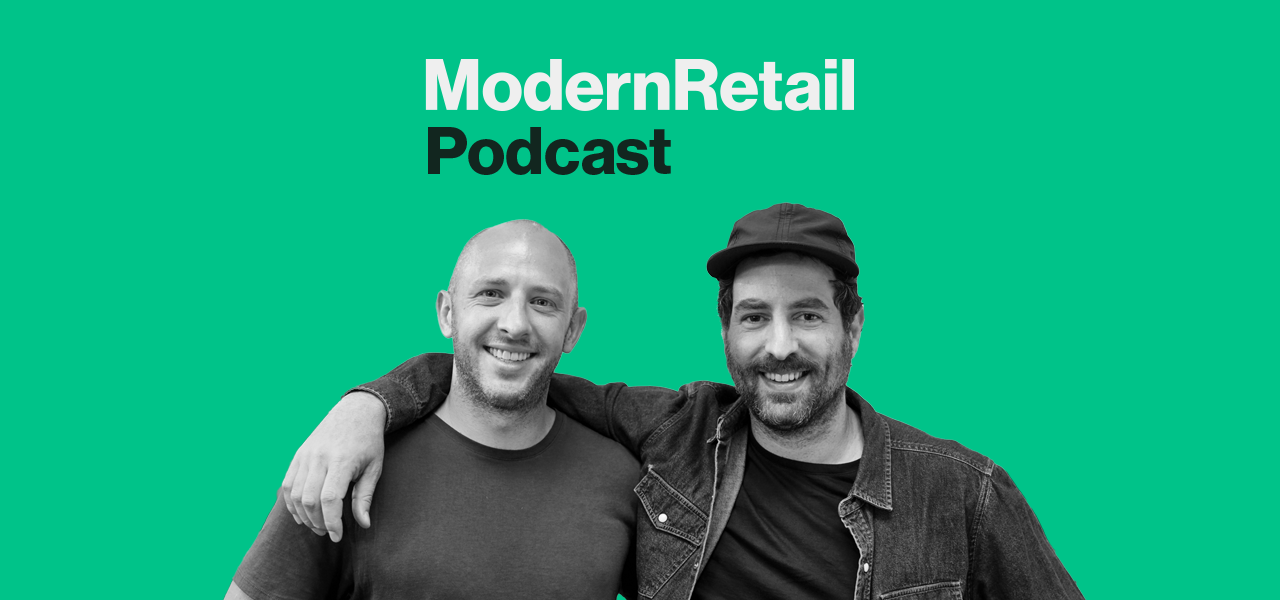‘Being very consistent’: Bombas co-founders David Heath & Randy Goldberg on how the apparel brand bucked the DTC doldrums

Subscribe: Apple Podcasts • Spotify
In a world of DTC booms and busts, Bombas has remained a rare constant.
The brand, best known for its socks, launched in 2013 as an online-only brand and has consistently grown since then. Today, it brings in over $300 million a year, and while e-commerce remains one of its major revenue channels, it has expanded into stores like Dick’s Sporting Goods and Nordstrom.
According to co-founders David Heath and Randy Goldberg, the key to Bombas’s success has been in staying focused on its core competencies and not expanding too quickly. “We were never the brand that was like let’s go out and raise $150 million and try to be the biggest company as quickly as possible,” said Heath.
The two co-founders joined the Modern Retail Podcast this week and spoke about how Bombas has been able to grow while remaining true to its DTC roots as well as what’s on the horizon for the brand.
The major constant of Bombas’s strategy has been being able to tell its story. The company sells basics like socks, underwear and t-shirts. And it also has a buy-one-give-one model that donates an item of clothing to a person experiencing homelessness. According to Heath, the company has always focused on telling that story as simply as possible. “From day one, as part of our go-to-market strategy, we invested heavily in brand,” he said.
But the other big lesson has been to figure out how to roll with the punches. As consumption patterns shift — and social algorithms change — so too does marketing. “I think that’s the hallmark of really good modern brands: you’re going to find people where they are in their world — and you’re attaching yourself to their life and not asking them to come into your world,” said Goldberg.
Ad position: web_incontent_pos1
Put together, Bombas has figured out a model that doesn’t stray from its root but allows it to grow to the hundreds of millions. And the co-founders plan on keeping with that plan this year and beyond.
“We look at the brands that we admire — the Nikes, the Lulus, Under Armours, Patagonias of the world,” said Heath. “These brands have all been around for 20, 30, 40 years, and they’ve built brick by brick every single year.”
Here are a few highlights from the conversation, which have been lightly edited for clarity.
A focus on building brand
Heath: “From day one, as part of our go-to-market strategy, we invested heavily in brand. So Randy is a brand strategist, one of our other co-founders, Aaron, is a creative director who spent his whole life at creative agencies. And so we had that skill and competency in-house from day one. So everything that we did — whether it was launching our Indiegogo campaign to building our website to our customer interactions to our emails — even though we were small and didn’t have very many resources, we made sure we looked at everything through a very consistent brand lens.”
How Bombas avoided being Facebook dependent
Goldberg: “We got really good at marketing on Facebook and Facebook has been a great partner for us through the years, but the demographic has changed. The way it works has changed. So we’ve had to expand and we’ve had to diversify. And we’ve had to go meet people where they are. I think that’s the hallmark of really good modern brands: you’re going to find people where they are in their world — and you’re attaching yourself to their life and not asking them to come into your world. You have to grind it out a little bit. And you have to find success in multiple different places. And you do have to insulate yourself from the woes of Facebook, but also, maybe you can use that to your advantage and be great there when everybody else is ignoring it. Or maybe you can be great at email, which gets ignored sometimes and feels a little bit old school but is an incredible way to continue to bring life to your customer base.”
Ad position: web_incontent_pos2
How Bombas avoided the DTC bust
Heath: “We were never the brand that was like let’s go out and raise $150 million and try to be the biggest company as quickly as possible. We look at the brands that we admire — the Nikes, the Lulus, Under Armours, Patagonias of the world. These brands have all been around for 20, 30, 40 years, and they’ve built brick by brick every single year. And they never aspired to be the fastest biggest company as quickly as possible; I think a lot of the DTC brands over the last decade that have come — and mostly have gone — approached it with that approach. And that’s not how you build good long-term brand and company value. You’ve got to earn the trust of the consumer by being very consistent. And consistency is something that I think we’re very, very focused on as we think about every new strategy that we deploy.”
Managing a team that has grown beyond its startup roots
Goldberg: “As an executive team, as we’ve grown, you have to have that trust built in that people are going to do some things and take some swings. And then you have to have the culture where accountability allows people to stand up and take credit for things or we can make mistakes and move on and learn from them. If you’re not doing these types of things where occasionally somebody says the numbers say this, but we just have a feeling about this, then you’re probably not going to get to that next level. I think you can only get so far just always going by the book.”

